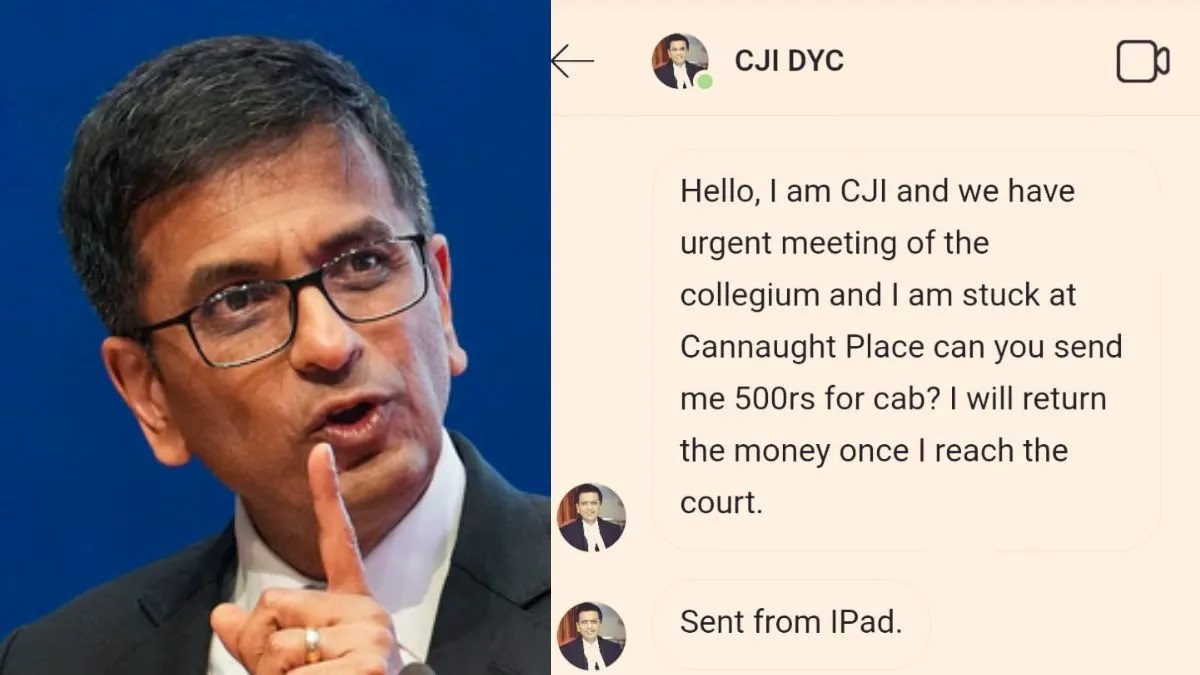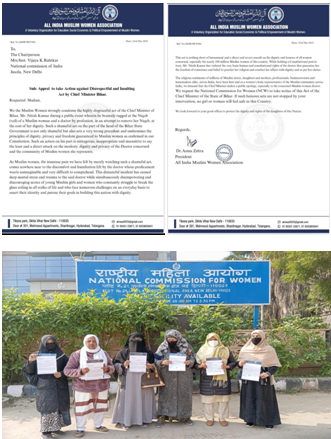
Beware of Phishing Scams: Fraudulent Message Circulating in the Name of the Chief Justice of India
Beware of Phishing Scams: Fraudulent Message Circulating in the Name of the Chief Justice of India
EC News Desk
28 August 2024
In a concerning development, a fraudulent message is circulating, falsely claiming to be from the Chief Justice of India (CJI), Justice D.Y. Chandrachud. The message, which appears to be a blatant phishing attempt, asks recipients for an urgent transfer of funds, claiming the CJI is in immediate need of 500 INR for a cab fare. The sender promises to return the money once they reach the court, adding a veneer of urgency and credibility to the scam.
The message is deceptively crafted to appear as though it is coming from the official channels of the CJI. It reads, “Hello, I am CJI and we have an urgent meeting of the collegium and I am stuck at Cannaught Place. Can you send me 500rs for cab? I will return the money once I reach the court. Sent from IPad.” The casual tone, minor grammatical errors, and the implausibility of the situation make this message highly suspect.

Several aspects of the message raise immediate red flags:
1. Improbable Scenario: It is highly unlikely that the Chief Justice of India would find himself stranded without access to necessary funds, much less need to ask a random individual for help.
2. Urgency Tactic: Scammers often use urgent language to pressure recipients into acting quickly without questioning the legitimacy of the request. This is a common tactic designed to bypass critical thinking.
3. Informal Communication: High-ranking officials such as the CJI typically communicate through formal channels. A request for funds via a casual message, especially one that includes common grammatical errors, is highly uncharacteristic.
In light of this incident, authorities are urging the public to exercise extreme caution when dealing with unsolicited requests for money, particularly when they come from seemingly authoritative figures. “These kinds of scams are designed to exploit trust and create a false sense of urgency,” said a representative from the cybersecurity division. “We advise everyone to verify the authenticity of such messages before taking any action.” He added.

To safeguard against such phishing scams, it is essential to follow these precautionary steps:
Verify the Sender: If you receive a message from a high-profile individual requesting money, take the time to verify the sender’s identity through official channels.
Do Not Rush: Scammers often pressure victims to act quickly. Always take a moment to assess the situation and consult with someone you trust before responding.
Avoid Sharing Personal Information: Never share sensitive personal or financial information in response to an unsolicited message.
Report Suspicious Activity: If you encounter a suspicious message, report it immediately to the relevant authorities or the platform where the communication occurred.
This incident serves as a stark reminder of the sophisticated tactics used by cybercriminals to defraud unsuspecting individuals. By remaining vigilant and informed, the public can protect themselves from falling victim to such deceptive schemes. Always remember, if something seems unusual or too good to be true, it probably is. Stay safe, and report any suspicious activity to help prevent others from being scammed.
You May Also Like
 Breaking News
Breaking NewsIsrael’s confession of Killings of Palestinians! (War in the name of ceasefire, The Board of Peace is a Shield for Israel)
Israel’s confession of Killings of Palestinians! All talk of peace is just a lie...
 Breaking News
Breaking NewsGrand Convocation Ceremony Held at MMERC, Mumbai
Grand Convocation Ceremony Held at MMERC, Mumbai EC News Desk 7 February 2026 Mumbai:...
 Breaking News
Breaking News₹10 Lakh Government Grant Sanctioned under Madrasa Modernisation Scheme
₹10 Lakh Government Grant Sanctioned under Madrasa Modernisation Scheme Applications open until November 13;...
 Breaking News
Breaking NewsAd Darain Education Centre Successfully Conducts 3 Days Teacher Training Workshop
Ad Darain Education Centre Successfully Conducts 3 Days Teacher Training Workshop EC News Desk...
 Breaking News
Breaking News“A Speech Without Audience Engagement and Intellectual Depth Remains Ineffective”_ Suhail Masood
“A Speech Without Audience Engagement and Intellectual Depth Remains Ineffective”_ Suhail Masood EC News...
 Breaking News
Breaking NewsMuslim Women Delegation Meets National Commission for Women, Submits Complaint Against Bihar Chief Minister
EC News Desk 23/12/2025 A delegation of Muslim women led by Mrs. Mamdooha Majid,...

Comments (0)
Leave a Comment